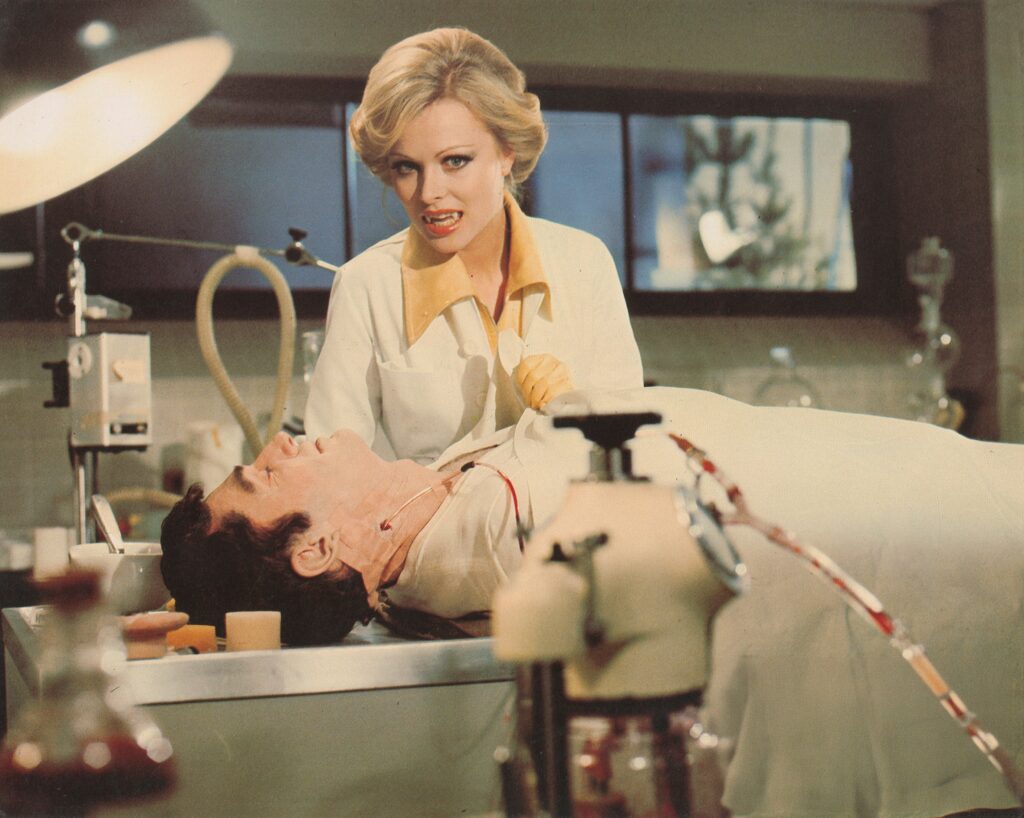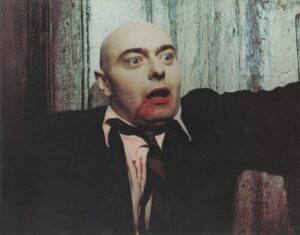
La Retrospettiva del 75° Festival Internazionale del Cinema di Berlino avrà il titolo “Wild, Weird, Bloody“: la proposta della prossima Berlinale ha come obiettivo quello di miscelare insolito e stravagante con azione, brividi e immagini esplicite in 15 film di genere selezionati dalla produzione cinematografica della Germania dell’Est e dell’Ovest realizzati negli anni ’70.

Influenzati dall’ondata di film di sfruttamento dell’epoca, gli anni ’70 sono un tesoro di film stravaganti che hanno aperto nuove strade narrative ed estetiche. Fu un decennio in cui una generazione di giovani registi tentò la sorte e mise alla prova i confini tra i generi. Con Deadlock (BRD, 1970), Roland Klick ci offre un mix di film di gangster post-apocalittico e western psichedelico. Nello stesso anno, Hans W. Geißendörfer si rivolse al genere horror con il suo imponente film di vampiri Jonathan (BRD, 1970). I registi della Germania Ovest avevano controparti nella Germania Est, come Horst Bonnet, con il suo insolito adattamento dell’operetta Orpheus in der Unterwelt (Orfeo all’inferno, DDR, 1974), e la satira di Günter Reisch Nelken in Aspik (Chiodi di garofano in aspic, DDR, 1976).
La sezione proietterà anche film di registi come Rainer Erler, Klaus Lemke, Ulli Lommel e Wolfgang Petersen, ampliando la Retrospettiva 2025 per includere generi come il Biker Film, il thriller e il musical.
Tricia Tuttle, direttrice della Berlinale: “Il pubblico moderno abbraccia con entusiasmo il cinema di genere e si diverte a rintracciare le radici del cinema poliziesco, fantascientifico, dell’orrore e di altri generi fino ai primissimi giorni della loro nascita. Questa selezione di grandi emozioni e spargimenti di sangue offre tante scoperte e getta luce su nuovi aspetti del cinema tedesco. Non vediamo l’ora di condividerla con il pubblico, locale e internazionale”.
Rainer Rother, responsabile della sezione e direttore artistico della Deutsche Kinemathek, ha spiegato: “Un luogo comune di vecchia data vuole che i tedeschi non siano capaci di fare cinema di genere. Ma in realtà, il cinema tedesco degli inizi gettò le basi che influenzarono lo sviluppo internazionale del cinema fantasy e di fantascienza. Ben oltre, sia i registi d’autore che le produzioni commerciali sono stati attratti dai film di genere per decenni. La nostra retrospettiva presenta film realizzati in mezzo ad altre correnti cinematografiche come il Nuovo Cinema Tedesco, che ha abbracciato il fascino e ha giocato con le possibilità di un buon film di genere“.
Durante la Berlinale, le proiezioni della retrospettiva saranno integrate da una serie di eventi presso l’E-Werk, la nuova sede della Deutsche Kinemathek.
Retrospective 2025
Wild, Weird, Bloody. German Genre Films of the 70s
Blutiger Freitag (Bloody Friday)
by Rolf Olsen | with Raimund Harmstorf, Amadeus August, Gila von Weitershausen, Gianni Macchia, Christine Böhm
Federal Republic of Germany / Italy 1972
A bank robbery in Munich goes south, ending in a hostage taking and a wave of violence. Loosely modelled on actual crimes, this German-Italian entry in the giallo genre is an impressive blend of realistic and over-the-top elements.
Deadlock
by Roland Klick | with Mario Adorf, Anthony Dawson, Marquard Bohm, Mascha Rabben, Sigurd Fitzek
Federal Republic of Germany 1970
Under the torrid sun in an abandoned desert settlement, there is a lethal battle over the spoils of a bank robbery. This heady spaghetti western features psychedelic music by Cologne kraut-rockers Can.
Einer von uns beiden (One or the Other of Us)
by Wolfgang Petersen | with Klaus Schwarzkopf, Elke Sommer, Jürgen Prochnow, Ulla Jacobsson, Kristina Nel
Federal Republic of Germany 1974
A broke drop-out blackmails a sociology professor after discovering that his dissertation was a plagiary. This action-packed film version of a “sociological thriller” set in Berlin was Wolfgang Petersen’s lead-in to a Hollywood career.
Fleisch (Spare Parts)
by Rainer Erler | with Jutta Speidel, Wolf Roth, Herbert Herrmann, Charlotte Kerr, Christoph Lindert
Federal Republic of Germany 1979
While a German couple is on their honeymoon in the USA, the groom is kidnapped by an ambulance crew. His bride joins forces with a trucker to try to find him. This 1979 thriller about the illicit trade in human organs triggered fierce debate at the time.
Fremde Stadt (Strange City)
by Rudolf Thome | with Roger Fritz, Karin Thome, Peter Moland, Werner Umberg, Eva Kinsky
Federal Republic of Germany 1972
A bank robber comes to Munich to ask for his ex-wife’s help in “laundering” the stolen money. He is soon running from a detective and a gaggle of other greedy pursuers. A black-and-white thriller in Cinemascope inspired by American B pictures.
Hut ab, wenn du küsst! (Hat Off When You Kiss)
by Rolf Losansky | with Angelika Waller, Alexander Lang, Rolf Römer, Günter Junghans, Günther Grabbert
German Democratic Republic 1971
A macho engineer has a problem with his girlfriend working as an auto mechanic. She sets about arousing the jealousy of her old- fashioned boyfriend. Set at East Germany’s Leipzig Trade Fair, this musical rom-com struck a blow for the Working Woman.
Jonathan
by Hans W. Geißendörfer | with Jürgen Jung, Hans-Dieter Jendreyko, Paul Albert Krumm, Hertha von Walther, Oskar von Schab
Federal Republic of Germany 1970
A blood-thirsty aristocrat and his followers terrorise an entire region – until the people rise up against them. A visually rich, fascinating genre film that echoes the politics of its time. Based loosely on leitmotifs from Bram Stoker’s “Dracula”.
Lady Dracula
by Franz Josef Gottlieb | with Evelyne Kraft, Brad Harris, Theo Lingen, Eddi Arent, Stephen Boyd
Federal Republic of Germany 1978
A vampire re-awakes 100 years after she was bitten by Count Dracula. The title character finds work, and victims, as a mortuary cosmetologist in Vienna. The film is a genre mix of horror, thriller, and crude jokes that sported a notable cast for the time.
Männer sind zum Lieben da (The Girls from Atlantis)
by Eckhart Schmidt | with Isi ter Jung, Horst Letten, Barbara Capell, Diana Nisbeth, Marianne Sock
Federal Republic of Germany 1970
A group of women from an alien realm shrink men by sleeping with them, and then kidnap them as sex slaves. But one of them falls in love with her victim. An enchanting satire of the soft-sex film genre with burlesque and poetic elements.
Nelken in Aspik (Carnations in Aspic)
by Günter Reisch | with Armin Mueller-Stahl, Helga Sasse, Erik S. Klein, Helga Göring, Herbert Köfer
German Democratic Republic 1976
To hide his lisp, a commercial artist stops talking altogether. Hailed as a savvy innovator, he advances to become director of an ad agency. Armin Mueller-Stahl is brilliant in this subversive satire of a dysfunctional East German working environment.
Nicht schummeln, Liebling! (Don’t Cheat, Darling!)
by Joachim Hasler | with Chris Doerk, Frank Schöbel, Dorit Gäbler, Christel Bodenstein, Karel Fiala
German Democratic Republic 1973
A school principal and her girls’ soccer team battle it out with the town’s men’s team, which has been accorded unheard of privileges by the mayor. A saucy musical featuring snazzy choreography and the East German pop stars Frank Schöbel and Chris Doerk.
Orpheus in der Unterwelt (Orpheus in the Underworld)
by Horst Bonnet | with Wolfgang Greese, Dorit Gäbler, Rolf Hoppe, Lisa Macheiner, Achim Wichert
German Democratic Republic 1973
The philandering Orpheus is forced to go to the rescue of his adulterous wife Eurydice who has been spirited away to Hades. This opulent film version of Jacques Offenbach’s suggestive operetta is full of satirical jabs at life in East Germany.
Output
by Michael Fengler | with Lou Castel, Katja Rupé, Bernd Herberger, Claus Eberth, Marquard Bohm
Federal Republic of Germany 1974
A crew of filmmakers and gangsters team up to enact a script in real life by robbing millions from a US military transport. A heist movie with perfect timing based on a hard-boiled thriller by Ulf Miehe, known as the German Raymond Chandler.
Rocker
by Klaus Lemke | with Hans-Jürgen Modschiedler, Gerd Kruskopf, Paul Lyss, Marianne Mim, Heidrun Rieckmann
Federal Republic of Germany 1972
A leather-boy from Hamburg and a 14-year-old drifter help each other out in a milieu teeming with violence. Shot on location with an amateur cast, this down and dirty biker flick paints an authentic picture of a big-city subculture.
Die Zärtlichkeit der Wölfe (Tenderness of the Wolves)
by Ulli Lommel | with Kurt Raab, Jeff Roden, Margit Carstensen, Ingrid Caven, Wolfgang Schenck
Federal Republic of Germany 1973
Ulli Lommel’s film about a serial killer in the early post-war era echoes the real story of “wolf man” murderer Fritz Haarmann. A mix of Fritz Lang’s M and Hitchcock’s Psycho that follows in the tradition of Weimar cinema.
Francesco Pensovecchio, classe 1969, è giornalista e risiede a Palermo. È Editor-in-Chief di Cinema & Berlinale. Ha collaborato con varie testate tra cui Wineinsicily per Assovini Sicilia, Slow Food Italia, Giunti Editore, Giornale di Sicilia, Gambero Rosso e Cronache di Gusto.







More Stories
Orso d’Oro 2025 a Dreams, il film norvegese che ha conquistato giuria e pubblico di Berlino
A Complete Unknown. Timothée Chalamet è Bob Dylan (ma il Biopic di Mangold convince?)
Berlinale 2025, Orso d’oro alla carriera per Tilda Swinton